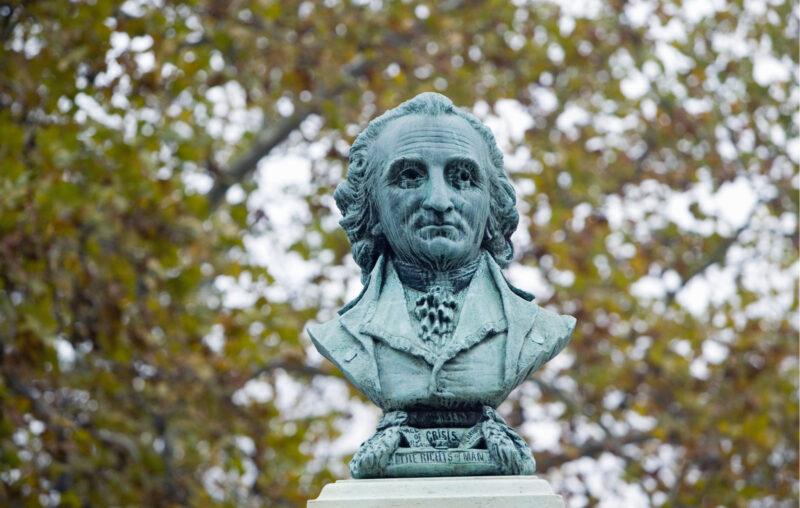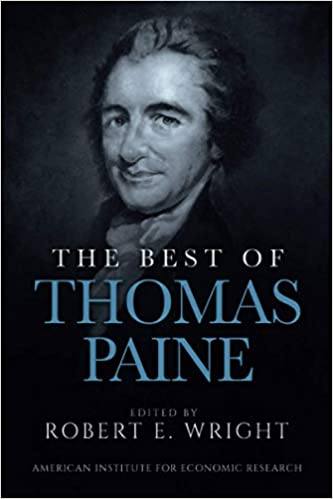
Note the title doesn’t refer to Biden, Trump, Obama, or the sundry actors, bigots, dolts, drunks, miscreants, narcissists, ne’er do wells, pettifoggers, philanderers, slaveholders, and statists who preceded them in the Oval Office. It refers to Thomas Paine’s notion of how America should select its presidents, and maybe its high court justices too.
Paine was a Founder but not a Framer, meaning that he was present at Independence, and indeed his Common Sense is widely credited with nudging the colonists toward nationhood. He did not, however, play a major role in the Constitutional Convention and had more to do with revolutionary France’s frame of government than America’s.
Nevertheless, Paine sketched out what he would like to see in a small-d democratic government, the details of which can be found in AIER’s new volume, edited by myself, The Best of Thomas Paine.
Although a superstar social media maven in his time, Paine today would be completely cancelled for holding unpopular views about universal human rights such as [TRIGGER WARNING!! MEMBERS OF THE COURT OF KING WOKE SHOULD AVERT THEIR EYES LEST THEY GO APOPLECTIC] equality under law, liberty, property, “resistance to oppression,” and security. Moreover, he believed that “every man is free to make known his thoughts and opinions. Freedom of the press, and every other means of publishing one’s opinion, cannot be interdicted, suspended, or limited.” Not even by Twitbook, not even during a pandemic election.
Paine also believed “the law should be equal for all, whether it rewards or punishes, protects or represses.” That would include trips to the coiffure, the fancy victualling-house, or one’s paramour. (We’ll never forget what you did, Nancy, Gavin, and Neil.) Sovereign immunity pained Paine, who argued that “those who solicit, further, sign, execute, or cause to be executed, such arbitrary acts are culpable, and should be punished.”
Executive orders were off the table for Paine, too, as “None should be punished save in virtue of a law formally enacted, promulgated anterior to the offence, and legally applied.” But even legislators faced limits because “The law should award only penalties strictly and evidently necessary to the general safety.” Yes, even during pandemics and other emergencies.
Also applicable even during pandemics is Paine’s contention that every person, not just ones deemed essential by public authorities, “may engage his services and his time.” Interestingly, Paine added the antislavery caveat that “he cannot sell himself; his person is not an alienable property.” (Even here the acolytes of King Woke will question his sanity because “everybody” now “knows” [wrongly] that slavery is essential to economic growth.)
But perhaps the most relevant of Paine’s governance scruples today is his take on the best way to select POTUS. He suggested that Congress make the choice by randomly choosing a state and then electing a member of that state’s congressional delegation as president. No state could have another president elected from its congressional delegation until all the states enjoyed a turn. That selection system, annual terms in office, and a 60 percent supermajority voting rule would ensure passage of only just laws, Paine took pains to explain. “He that will promote discord, under a government so equally formed as this,” he quipped with one of his many clever turns of phrase, “would join Lucifer in his revolt.”
Paine’s plea for a constitutional convention was eventually heard and followed but of course the Framers made the selection of POTUS much more complicated than Paine suggested, in part to maintain a major role for individual states in the process. The system as it evolved allots to marginal (“swing”) states the power to determine, honestly or fraudulently, the result of national elections, a problem that would not arise in Paine’s system of indirect election and random selection.
The random component of Paine’s process remains rife with possibilities. An Irish economist named Conall Boyle has argued for decades in print and on his website that random selection is a fairer and more efficient way of appointing judges, making hiring decisions, and even selecting leaders. It certainly takes the politics out of things and so long as the random draw is made from a pool of qualified candidates it is “dangerous” only to special interest groups and other swamp monsters. So rest assured it will never be implemented when it comes to POTUS!
A strong case can be made, however, for the random selection of SCOTUS justices, particularly if the court is ever enlarged. It is not clear why judges should be linked to political parties in any way, anyway. Switzerland, for example, is considering randomly drawing judges from a pre-qualified pool so they can uphold the law instead of party platforms.
If the Framers had anticipated the rise and reification of our current party duopoly they likely would have banned political participation by judges at all levels (or the parties themselves). Instead, America suffers hyper-partisanship even in its courts of law. If Paine still exists on some spiritual plain, he certainly feels the pain of his adopted homeland as it struggles to revivify its founding principles and regain independence from King Woke.
* This article was originally published here
HELP STOP THE SPREAD OF FAKE NEWS!
SHARE our articles and like our Facebook page and follow us on Twitter!





0 Comments